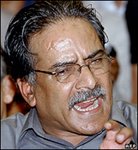 With the Rayamajhi Commission determined to question King Gyanendra on the “excesses” his government committed against the April Uprising, the next logical question becomes relevant. Will Nepalis finally get to see their citizen king in full public view, perhaps even live on national radio and television, offering answers the commission couldn’t get from ex-ministers and officials? Or will the “interrogation” consist of a questionnaire the monarch could fill out at leisure? (Is that what Prime Minister Girija Prasad Koirala delivered at the royal palace on Thursday?)
With the Rayamajhi Commission determined to question King Gyanendra on the “excesses” his government committed against the April Uprising, the next logical question becomes relevant. Will Nepalis finally get to see their citizen king in full public view, perhaps even live on national radio and television, offering answers the commission couldn’t get from ex-ministers and officials? Or will the “interrogation” consist of a questionnaire the monarch could fill out at leisure? (Is that what Prime Minister Girija Prasad Koirala delivered at the royal palace on Thursday?)Considering all that has been going on since the monarch reinstated the parliament that has voted him into political oblivion, it’s high time King Gyanendra told his side of the story. Land recognized as U.N. heritage sites have been included in an expanding list of royal assets. The monarch’s investments in commercial ventures are being portrayed as something inherently evil. (Can the fact that royal investments within the country have promoted employment and enriched government coffers be obscured?) Good Lord, ambassadors are still presenting credentials to the monarch and making farewell calls. Sanity still stands a chance.
After the 1990 changes, King Birendra was in a far favorable position. He didn’t shirk from complaining about all the politicking going around vis-à-vis the palace. This king has taken a vow of silence that matches neither his purported personality nor predilections. First, the monarch’s forbearance was blamed on depression. The next culprit was those late-night sessions of poker on the Internet. Dame S.S., representing the subversives across the southern border, has run out of story lines for the Indo-Asian community.
Now the royal hush is becoming menacingly portentous to even those who affirmed they had heard the last of the monarch when he reinstated the legislature. The ruling Seven Party Alliance (SPA) and the Maoists are warning of the reactionary storm lurking behind the royal silence. The fact that the acting army chief goes into parliament in civvies to acknowledge the supremacy of civilian rule counts for little.
In four months, the myths surrounding the April Uprising are coming apart. We had a protester die in a hospital in India. It turns out that martyrs are still being declared. The historic mandate has become the subject of mundane histrionics. The drafters of the interim statute became so desperate that they left it to the SPA and Maoists to fill in the blanks. The Maoists were the most eager for international mediation/facilitation/supervision. Now Baburam Bhattarai, Ph.D., has virtually disinvited the team.
Sensing the disarray, U.N. headquarters appears to have retroactively downgraded the Mistura Mission. Ian Martin got a promotion alright, but he doesn’t seem to know what to do next. A consignment of arms is interdicted in India, in a move that has multiplicity of meanings.
The chief Maoist propagandist has revealed how SPA leaders implored the “People’s Liberation Army” to destroy the royal regime’s spine and head. Yet Dr. Bhattarai remains silent on how the wily Maoists could be conned into a 12-point accord with twice as many holes. The rebels’ insistence on issuing separate statements cannot absolve them of their inanity. Prachanda and Dr. Bhattarai, moreover, can’t blame American Ambassador James F. Moriarty on this count because they knew His Excellency was in New Delhi when the accord was being initialed.
The royal regime’s “transit hub” platform has turned out not to be the much-maligned ploy to prolong its tenure. Nepal has formally tabled the proposal to India. Bangladeshis sound more excited than we are about Chinese railway being extended from Lhasa to the Nepalese border. Let’s not even begin dissecting the geopolitical significance of such sentiments.
Your Majesty, Nepalis are entitled to some explanation on things more important than those two-dozen-plus untimely and tragic deaths. We recognize that Your Majesty may not be privy to all that has transpired since those turbulent days in April. Yet much of what is happening now is rooted in the conflicting enticements, entreaties and intimidation from abroad the royal regime confronted behind the façade of the “democracy movement.”



